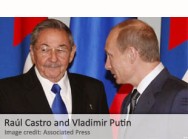 IntelNews – by JOSEPH FITSANAKIS
IntelNews – by JOSEPH FITSANAKIS
The government of the Russian Federation has reached an agreement with the authorities in Cuba to reopen an electronic communications listening base that was built by the Soviets during the Cold War. Russian newspaper Kommersant said on Wednesday that the agreement between the two nations was struck late last week during a visit to the communist-run island by Russian President Vladimir Putin.
The agreement centers on the Lourdes signals intelligence (SIGINT) facility, located just outside Cuban capital Havana. Situated approximately 100 miles from the United States mainland, the facility was used throughout the last two decades of the Cold War to provide intelligence for Soviet military and civilian spy agencies, while also operating as an overseas communications hub for the Soviet Navy.
It was regarded at the time as the most formidable Soviet electronic listening post located anywhere outside Soviet territory. Cuban authorities once bragged that Lourdes provided Moscow with 75 percent of its actionable intelligence on its American adversary —though some experts consider the statement an exaggeration. At its peak, in the late 1970s, Lourdes hosted approximately 3,000 technical specialists and support personnel, over half of whom were Soviet.
Initially, the Cuban government permitted Moscow to make use of Lourdes free of charge. However, in 1992 Havana introduced an annual rental fee, which by 2001 had risen to $200 million. Under the bilateral agreement, Russia was paying the rental fee in kind, by supplying the Cuban government with food products and fuel, as well as military equipment.
But in 2001, the administration of President Putin withdrew from the agreement, citing the high cost of maintaining the base. Moscow said at the time that it was financially impossible to keep up a SIGINT complex located 6 thousand miles away from Moscow. Some observers speculated at the time that Moscow’s decision to close down the listening post was part of a broader rapprochement with Washington, sparked by the events of 9/11.
However, according to Kommersant, Russia and Cuba began exploring the possibility of reopening Lourdes “a few years ago”, but only reached a final deal last Friday, when “a framework agreement was signed” by the two sides.
The Moscow-based daily added that improvements in signals collection technology meant that Lourdes could now operate at a much-reduced cost to Moscow, since fewer technicians would need to be permanently stationed there.
